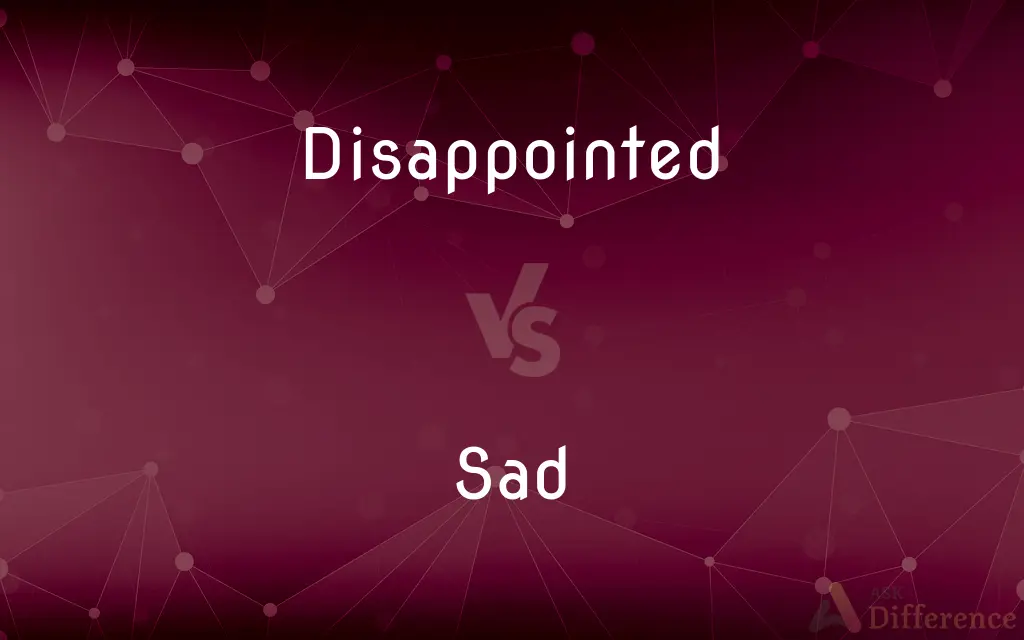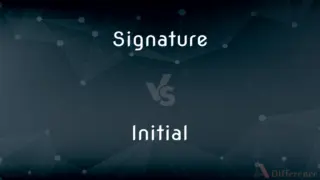Disappointed vs. Sad — What's the Difference?
By Maham Liaqat & Urooj Arif — Updated on April 23, 2024
Disappointed refers to feeling let down by unmet expectations, often situation-specific, whereas sadness is a deeper, more general emotional response to various forms of loss or unhappiness.

Difference Between Disappointed and Sad
Table of Contents
ADVERTISEMENT
Key Differences
Disappointment arises specifically from unmet expectations or hopes. For instance, feeling disappointed after failing to achieve a personal goal or when someone does not live up to what was expected of them. On the other hand, sadness can stem from a broader range of experiences, including loss, failure, or general unhappiness, not just from unmet expectations.
The emotional intensity of disappointment is often tied to the specific context and the importance of the unmet expectation. It might be relatively short-lived if the expectation was minor. In contrast, sadness can be more pervasive and long-lasting, affecting one's overall mood and outlook, without a specific trigger.
Disappointment typically leads to specific cognitive responses, such as reassessing one’s expectations or reconsidering future plans. Whereas, sadness might lead to a wider range of psychological reactions, including withdrawal from social activities, decreased energy, or a sense of hopelessness.
In terms of expression, disappointment often manifests as a feeling of letdown or frustration directed towards a particular event or person. Sadness, however, may be expressed through crying, a lack of motivation, or a subdued demeanor, reflecting a more encompassing emotional state.
Handling these emotions also differs; overcoming disappointment might involve adjusting expectations or finding alternative solutions, which is often cognitive and strategic. Meanwhile, managing sadness might require emotional support, time to heal, or professional help, indicating a deeper emotional processing.
ADVERTISEMENT
Comparison Chart
Definition
Feeling of being let down by unmet expectations
Emotional pain associated with or characterized by feelings of disadvantage, loss, despair, grief, helplessness, disappointment, and sorrow
Cause
Unmet expectations from specific situations
Broad range of negative emotional triggers
Duration
Often short-lived, dependent on specific context
Can be long-lasting, pervasive
Psychological Response
Cognitive reassessment of expectations
Wide range of emotional and psychological responses
Management Strategies
Adjusting expectations, finding alternatives
Emotional support, time, professional counseling
Compare with Definitions
Disappointed
Feeling let down due to unmet expectations.
He was disappointed when the concert was canceled at the last minute.
Sad
An emotional state characterized by feelings of unhappiness.
She was sad about the news of her friend moving away.
Disappointed
A response to a specific unmet desire or expectation.
She felt disappointed not making the team despite her efforts.
Sad
More pervasive and not necessarily linked to specific events.
The gloomy weather made her feel sad throughout the day.
Disappointed
Can be resolved by reassessing one’s expectations.
After being disappointed by the movie's ending, he adjusted his expectations for sequels.
Sad
Can be expressed through various behaviors like crying or withdrawal.
He was so sad that he didn’t attend the party.
Disappointed
Involves a cognitive emotion specific to situations.
His disappointment was evident when he discussed the project’s failure.
Sad
Often requires emotional processing to overcome.
She took her time to be sad and heal after her loss.
Disappointed
Often tied to specific events or outcomes.
The disappointing turnout for the event made the organizers rethink their strategy.
Sad
Can be triggered by a wide variety of emotional disappointments.
The ongoing conflict left him feeling deeply sad.
Disappointed
Sad or displeased because someone or something has failed to fulfil one's hopes or expectations
I'm disappointed in you, Mary
Thousands of disappointed customers were kept waiting
Sad
Feeling or showing sorrow; unhappy
They looked at her with sad, anxious faces
I was sad and subdued
Disappointed
Thwarted in hope, desire, or expectation.
Sad
Pathetically inadequate or unfashionable
The show is tongue-in-cheek—anyone who takes it seriously is a bit sad
Disappointed
Defeated of expectations or hope; experiencing disappointment; let down.
After all his anticipation, the trip left him deeply disappointed.
Sad
(of dough) heavy through having failed to rise.
Disappointed
Having had a marriage proposal rejected.
Sad
Showing, expressing, or feeling sorrow or unhappiness
A sad face.
Disappointed
Expressing or indicating disappointment.
A disappointed tone / face / silence
Sad
Causing sorrow or gloom; depressing
A sad movie.
Sad news.
Disappointed
Simple past tense and past participle of disappoint
Sad
Deplorable or inadequate; sorry
A sad state of affairs.
A sad excuse.
Disappointed
Defeated of expectation or hope; balked; as, a disappointed person or hope.
Sad
Dark-hued; somber.
Disappointed
Unprepared; unequipped.
Cut off even in the blossoms of my sin,Unhouseled, disappointed, unaneled.
Sad
(heading) Emotionally negative.
Disappointed
Disappointingly unsuccessful;
Disappointed expectations and thwarted ambitions
Their foiled attempt to capture Calais
Many frustrated poets end as pipe-smoking teachers
His best efforts were thwarted
Sad
Feeling sorrow; sorrowful, mournful.
She gets sad when he's away.
Sad
Appearing sorrowful.
The puppy had a sad little face.
Sad
Causing sorrow; lamentable.
It's a sad fact that most rapes go unreported.
Sad
Poor in quality, bad; shameful, deplorable; later, regrettable, poor.
That's the saddest-looking pickup truck I've ever seen.
Sad
Of colours: dark, deep; later, sombre, dull.
Sad
(obsolete) Sated, having had one's fill; satisfied, weary.
Sad
(obsolete) Steadfast, valiant.
Sad
(obsolete) Dignified, serious, grave.
Sad
(obsolete) Naughty; troublesome; wicked.
Sad
(slang) Unfashionable; socially inadequate or undesirable.
I can't believe you use drugs; you're so sad!
Sad
(dialect) Soggy (to refer to pastries).
Sad
(obsolete) Heavy; weighty; ponderous; close; hard.
Sad
To make melancholy; to sadden or grieve (someone).
Sad
Sated; satisfied; weary; tired.
Yet of that art they can not waxen sad,For unto them it is a bitter sweet.
Sad
Heavy; weighty; ponderous; close; hard.
His hand, more sad than lump of lead.
Chalky lands are naturally cold and sad.
Sad
Dull; grave; dark; somber; - said of colors.
Woad, or wade, is used by the dyers to lay the foundation of all sad colors.
Sad
Serious; grave; sober; steadfast; not light or frivolous.
Lady Catharine, a sad and religious woman.
Which treaty was wisely handled by sad and discrete counsel of both parties.
Sad
Affected with grief or unhappiness; cast down with affliction; downcast; gloomy; mournful.
First were we sad, fearing you would not come;Now sadder, that you come so unprovided.
The angelic guards ascended, mute and sad.
Sad
Afflictive; calamitous; causing sorrow; as, a sad accident; a sad misfortune.
Sad
Hence, bad; naughty; troublesome; wicked.
Sad
To make sorrowful; to sadden.
How it sadded the minister's spirits!
Sad
Seasonal affective disorder.
Sad
Experiencing or showing sorrow or unhappiness;
Feeling sad because his dog had died
Better by far that you should forget and smile / Than that you should remember and be sad
Sad
Of things that make you feel sad;
Sad news
She doesn't like sad movies
It was a very sad story
When I am dead, my dearest, / Sing no sad songs for me
Sad
Bad; unfortunate;
My finances were in a deplorable state
A lamentable decision
Her clothes were in sad shape
A sorry state of affairs
Common Curiosities
Is it normal to feel both disappointed and sad at the same time?
Yes, it's common to experience both emotions simultaneously, especially if disappointment in a highly anticipated event leads to sadness.
What differentiates being disappointed from being sad?
Disappointment is specifically related to unmet expectations, while sadness is a broader emotional state that can arise from various types of emotional discomfort.
How can one manage feelings of disappointment?
Managing disappointment often involves reassessing and possibly adjusting expectations or focusing on alternative approaches to the situation.
Can disappointment lead to sadness?
Yes, persistent or significant disappointment can lead to feelings of sadness, especially if the unmet expectations had emotional significance.
What are common triggers for sadness?
Sadness can be triggered by loss, failure, conflict, or other distressing circumstances affecting one’s emotional well-being.
What role does expectation play in feeling disappointed?
Expectation is central to disappointment; unmet expectations are the direct cause of this emotion.
What psychological theories address disappointment and sadness?
Various psychological theories, including cognitive-behavioral theory, address these emotions by focusing on thought patterns and behaviors.
How do cultural differences impact the perception of disappointment and sadness?
Cultural backgrounds can influence how openly individuals express these emotions and the strategies they use to cope with them.
Can both emotions affect mental health?
Yes, both disappointment and sadness can impact mental health, particularly if these emotions are intense or prolonged.
Can sadness be beneficial?
Yes, experiencing sadness can be part of a healthy emotional process, allowing for reflection and emotional growth.
What are signs of sadness that differentiate it from disappointment?
Signs of sadness include prolonged unhappiness, crying, withdrawal from social interactions, and a general decrease in energy, which are broader and more intense than those of disappointment.
How long does disappointment last compared to sadness?
Disappointment tends to be shorter-lived and more context-specific, while sadness can be more enduring and pervasive.
Is therapy a viable option for managing these emotions?
Yes, therapy can be very helpful, especially for managing pervasive sadness or recurrent disappointment that affects one's quality of life.
How do disappointment and sadness affect relationships?
These emotions can strain relationships if not communicated properly or if they lead to withdrawal or frustration.
How should one approach someone who is feeling disappointed or sad?
Approaching with empathy, offering support, and listening without immediate judgment or solutions are effective ways to help.
Share Your Discovery

Previous Comparison
Signature vs. Initial
Next Comparison
Width vs. BreadthAuthor Spotlight
Written by
Maham LiaqatCo-written by
Urooj ArifUrooj is a skilled content writer at Ask Difference, known for her exceptional ability to simplify complex topics into engaging and informative content. With a passion for research and a flair for clear, concise writing, she consistently delivers articles that resonate with our diverse audience.
















































